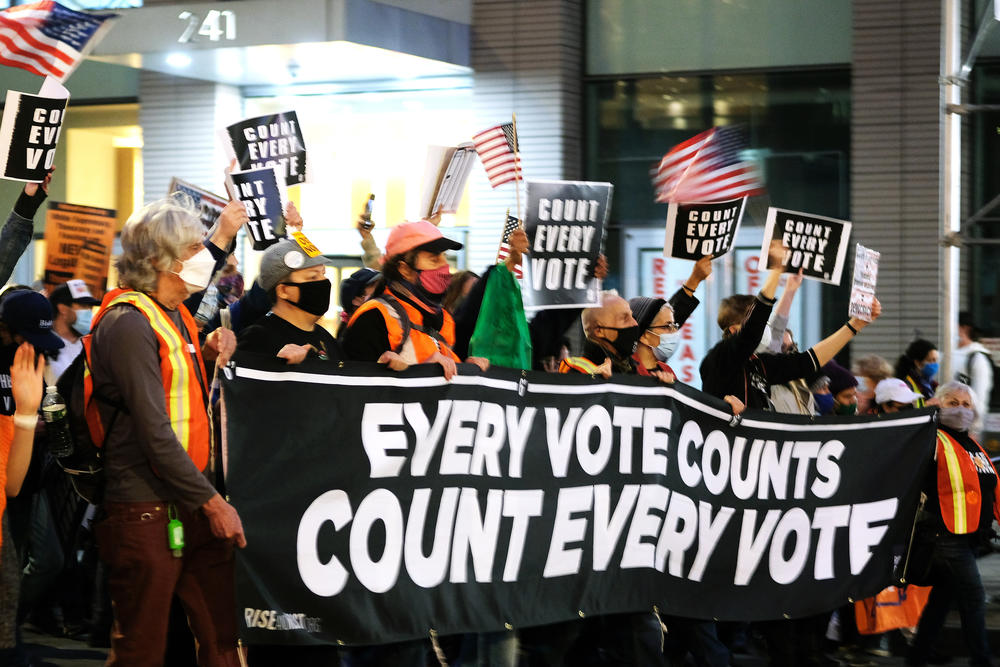What does the outcome of the U.S. elections mean for the Liberal Script?
Count Every Vote March, NYC
Image Credit: doug turetsky (Flickr)
The election of Joe Biden as the next president of the United States was a sharp contest between those who supported the liberal order and those who questioned basic values and rights. The big question and challenge facing the incoming administration is whether the political polarization that characterized the campaign can be overcome. In this regard, we asked some experts to answer that question:
News from Nov 10, 2020
Doctoral Researcher
Freie Universität Berlin, Berlin Social Science Center
Global Governance Department
Those of us hoping for a repudiation of the Trump presidency, found ourselves sorely disappointed on November 3. There was no blue-wave. No resounding rejection of the last four years. Instead, a portrait of a nation divided came into clear and bitter focus. Over 68 million Americans voted for Donald Trump. These voters came from large cities and tiny hamlets; from blue-collar communities and high-earning suburbs. There is a politics of resentment which animates this coalition, rooted in deep cultural and economic grievances. Here, the conflict lines in American society run neither left nor right, but along a new and toxic identity axis. Our political preferences have merged with our social and cultural attitudes to ensure a more embittered politics.
Whereas the traditional left/right axis supported a degree of consensus across parties, today’s much more personal cleavage informs a politics of mutual disdain. The distinction here is an important one: Identity-based politics is structurally less inclined towards compromise. It is rawer and more emotional because it is non-negotiable. As the nation comes to terms with the results––results that may be contested in the coming weeks––Biden’s victory rings somewhat hollow. I fear a house divided cannot stand.
Tanja A. Börzel
Director, Cluster of Excellence “Contestations of the Liberal Script”
Berlin Center for European Studies, Freie Universität Berlin
Thomas Risse
BIRT Director, Principal Investigator
Otto Suhr Institute for Political Science, Freie Universität Berlin
And Now On to the Hard Part…
The nightmare is (hopefully) over. Joe Biden is U.S. president-elect with more than 74 million votes and a clear majority in the Electoral College. Yet, 70 million U.S. citizens still voted for Donald Trump, who preached and practiced an aggressive unilateralism. The two numbers describe the challenge ahead for the Biden-Harris administration: to bring America back together again!
What does this mean for the liberal international order (LIO)? The good news is: A Biden-Harris administration will stop withdrawing from liberal international institutions. Yet, the times of global U.S. leadership are definitely over, at least for the time being. President Biden will seek to mend fences with U.S allies. Like Trump, however, he will ask the Europeans to contribute their fair share to preserving LIO. Europe has no excuse any more for not standing up against attempts of Russia and China to roll back liberal norms and values and for not building up its own capabilities to protect them.
Biden’s victory is no time for Europeans to sit back and relax. On the contrary, they finally need to step up to the plate and provide the global liberal leadership that the world and the people are waiting for.
Jessica Gienow-Hecht
Principal Investigator
John F. Kennedy Institute for North American Studies
First of all, utter relief. Relief that those past 4 years of insecurity, of permanent tension, and lack of cooperation are over. Liberalism, on its way out of the door, has triumphed over autocratic populism and narcissist self-interest. Normalcy, it appears, – with its ups and downs – will return to the White House, to Washington, to the U.S. and the World.
Second, utter worry. Donald Trump did extremely well in the elections. There are over 70 million voters out there who have put their bet on him and against Joe Biden. Trump the loser may be infinitely more aggressive than Trump the winner. Liberalism will continue to be under siege.
Third, utter caution. Trump is a symptom, not a cause. Biden calls himself a transitional president and he is; his type in many ways, is a compromise the party struck to gain the majority. But as a model president, he is yesterday’s stuff. What is more, Trump has shown us that the language and rhetoric of the political discourse has shifted quite dramatically. Future politicians need to take that very seriously. When the honeymoon is over, Democrats need to listen to those 70 million plus voters who voted for Trump. Their concerns are real. They are not going to go away. Democrats need to go out and find the voters, appeal to them, craft an agenda that wins them over. The Liberal Script anticipates just that: the ability to converse with those we disagree with.
Fourth, unconditionally and most importantly: the system worked. Liberalism is as good as the institutions representing it, and the institutions are as good as the people in it. They are the ones inspiring trust and order. Over the past four years, we have seen a battle between the executive on the one hand and a system of checks and balances, on the other.

